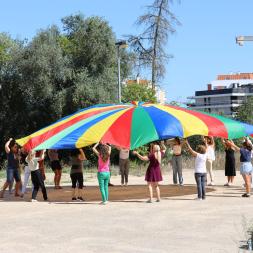
The primary school classroom – effective teaching approaches for an inclusive classroom through NFE tools and resources
Children’s rights, diversity, tolerance, empathy, non-violence related issues and non-formal education (NFE) teaching approaches have become important considering the diversity of our societies.
Schooling could play a key role but teachers must have the relevant knowledge, skills and tools.
Description
This 7-day course will empower primary school teachers with the skills and knowledge how to organize relevant training sessions for their students so that the teaching process meets everybody’s needs. Students will become more open-minded and acquire active citizenship skills. The course is the result of an Erasmus+ partnerships - cross-sectoral school education project Young Learners Embrace Social Inclusion and Social Involvement (YESI). The partners - Prosveta-Sofia Foundation, IP Santarem – Portugal and AENAO – Greece, developed a Teachers’ Toolkit comprising 38 training resources distributed in 3 modules: Children’s Rights - Human rights, Diversity and Social Inclusion, and Active Citizenship and Social Involvement. Participants in the training course will have free-access to the ready-to-use training materials. Each topic is accompanied by a number of multimedia objects, e.g. animated cartoons, video clips, filmed drama performances and discussions, simulations, case studies as basis for discussions, interactive e-games, etc. Multimedia objects are ready-to-use materials meant to support teachers' work as mediators in the trainings. The multimedia resources are described with the corresponding characteristics as learning objects in the Toolkit.
After participating in the training course participants will be supported in the practical implementation of the newly acquired skills and competences. They are expected to deliver trainings to their students using the topics in the Teachers’ Toolkit which they will be taught how to use. We will provide mentors for all teachers who will be at the participants’ disposal during a 6-month-period after the training course.
Learning objectives
The course aims to support teachers in:
1. Getting deeper in the specifics of the Inclusive Classroom’s major characteristics.
2. Learning what the 3 Hs of the inclusive teacher are.
3. Getting the knowledge of basics in Children’s Rights, Diversity and Involvement education through the topics in the Teachers' Toolkit.
4. Mastering skills which will enable them to discuss with their students questions on existing notions of human differences in modern society and run relevant activities choosing from the ones suggested in the Teachers’ Toolkit considering the local context.
5. Getting to know non-formal education teaching approaches and start using them not only in the suggested civic education trainings but also in the routine teaching process.
6. Responsibly accepting a code of behaviour so that all their actions and interactions bear respect to students’ individuality by participating in the course training sessions together with a diverse group of European teachers.
7. Learn more about the challenges Portuguese teachers have faced regarding the use of the Teachers’ Toolkit through the planned sessions with the involvement of Portuguese teachers who have piloted the training topics.
8. Learn how to work in international teams through the group and pair activities.
Methodology & assessment
The pedagogical methods that we use are based upon experiential training, group and peer activities, learning-by-doing and best practices’ exchange.
Teachers will learn about and participate in implementing a diverse number of non-formal ways for delivering contents in which trainees are active participants, e.g. simulations, role plays, guided drama activities, theatre of the oppressed, interactive video resources, games, group and pair work, mind-mapping, creating artistic productions – collages, drawings, dances, poems/ prose, etc.
Local Portuguese teachers who have previously used the Manual and have delivered the suggested trainings to their students will participate in specialized sessions during which they will talk about their experiences and provide some first-hand tips and support to the course participants. Local visits to the schools could be organized depending on the participants’ needs and the spread of the COVID-19 virus.
The training team is multinational - experienced trainers from Bulgaria, Portugal, and Greece, who have participated in the design of the Teachers’ Manual and the past teacher trainings within the YESI project.
Certification details
At the end of the course, each participant will receive a certificate of attendance and a Europass Mobility Certificate.
We will support the participants in the certification process by delivering a special session devoted to Europass mobility certificates, as well as in the validation of learning outcomes process by providing mentors to all trainees during the implementation process when they will deliver trainings to their students using the Teachers’ Manual topics.
We will provide photos of the training course and a selection of videos that can be used for visibility and dissemination purposes. The teachers’ Manual and all digital resources will be freely available to all trainees for prospective trainings and re-dissemination among colleagues and students.
Pricing, packages and other information
-
Price:560Euro
Additional information
-
Language:English
-
Target audience ISCED:Primary education (ISCED 1)
-
Target audience type:School PsychologistTeacherTeacher Educator
-
Learning time:25 hours or more


